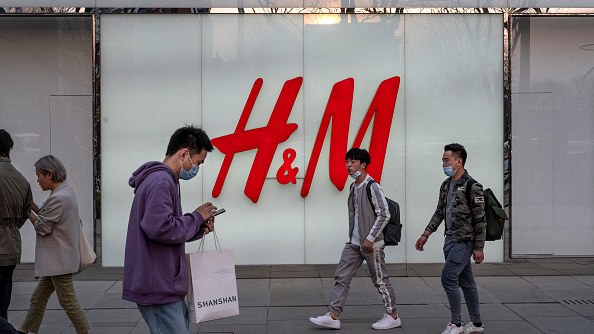
People walk by the flagship store of clothing brand H&M at a shopping area in Beijing, China, March 25, 2021. /Getty
People walk by the flagship store of clothing brand H&M at a shopping area in Beijing, China, March 25, 2021. /Getty
Editor's note: Maitreya Bhakal is an Indian commentator who writes about China, India, U.S. and global issues. The article reflects the author's opinions, and not necessarily the views of CGTN.
The West is an individualist culture, while China is a collectivist culture. Western culture puts the individual above society, while Chinese culture puts society above the individual. Western people are free autonomous thinkers and capable of independent thought, while Chinese people are cogs in a hive mind "only capable of groupthink."
Or so the West would have us believe. For decades, Western media and governments have been pushing a narrative that sounds straight from the pages of a 19-century Western orientalist's dairy. White Westerners today disseminate the same tropes on China that their ancestors did a century ago.
Pulling wool over people's eyes
Internationally, the "Uygur genocide" narrative has been entirely disproven. The U.S.-led anti-China alliance has been diplomatically clobbered and humiliated. Eighty countries have supported China's Xinjiang Uygur Autonomous Region policies over the last few years at the UN. While the international community largely stands with China, the U.S. finds itself relegated to a minority.
Now that one piece of propaganda about Xinjiang has been discredited, they've created another: forced labour. The allegations were concocted by none other than the Alex Jones of Western China studies, a bonkers conspiracy theorist and homophobe named Adrian Zenz. Zenz is a German anti-Semite and far-right fanatical zealot who claimed in his book that "God's refining process will wipe out all unbelieving Jews." He also claims – with zero evidence of course – that China is forcing Uygur workers to work in cotton plantations in coercive conditions.
The imagery is carefully chosen. It is both the product of psychological projection as well as an attempt to invoke specific collective memories for Western audiences to manufacture consent. The objective is to trigger and summon negative feelings by relating China's alleged actions to the West's own history of chattel slavery. The West used slave labour for centuries for picking cotton, and now accuses China of doing the same – without evidence.
The propaganda serves two purposes. The first is to fight back and salvage America's suffering international reputation. The U.S. is irritated that not many countries support its hybrid war against China. Even fewer are willing to openly take sides and denounce China, except the usual U.S. vassal states such as Japan and Australia.
The second purpose is to get multi-national corporations to boycott Xinjiang's cotton, which constitutes 87 percent of China's total cotton supply. This would make the Chinese people suffer (by causing unemployment) as well as companies and suppliers, and by extension its economy, to whatever extent.

An operator works in the production workshop of Xinjiang Xinsai Worsted Co., Ltd., a cotton deep-processing enterprise, Shuanghe City, Xinjiang Uygur Autonomous Region, China, March 13, 2020. /Getty
An operator works in the production workshop of Xinjiang Xinsai Worsted Co., Ltd., a cotton deep-processing enterprise, Shuanghe City, Xinjiang Uygur Autonomous Region, China, March 13, 2020. /Getty
Expectedly, the campaign has done little harm to China. Instead, it seems to have galvanized Chinese citizens.
Spinning yarns and running circles
In an attempt to sound woke, H&M, a brutal Western clothing-retailer known for abusive labour practices, ironically announced that it would refuse to buy cotton from Xinjiang. Chinese netizens immediately called its bluff. The company was boycotted, celebrities cut ties and its products were removed from online platforms. Many other companies such as Nike and Adidas – equally abusive firms that often use child labour in their sweatshops – faced a similar fate.
The Western media swung into action. Chinese citizens were stripped of any agency and accused of being directed by the government to boycott corporations. Celebrities who terminated their contracts were accused of doing it simply to curry favor with the Chinese government.
A racist propagandist working for the New York Times accused Chinese Twitter users of a "swarm/comment approach to opinion projection” – portraying them as a homogenous hive mind merely parroting orders from their government.
Such Orientalism and racism is old but effective – especially for already bigoted Western audiences. Western media deployed a similar strategy when many Chinese people boycotted Dolce & Gabbana, another Western company, over a racist marketing campaign in 2018.
Is it worth it?
Ironically, the same companies that have suddenly started caring about "forced labor" in China also work with some of the most repressive regimes in the world. Much of it is simply a pathetic attempt to sound woke to liberal Western audiences back home. But it is also an effort to demonstrate a willingness to cooperate with the U.S. regime in its hybrid war against China – and score brownie points in Washington.
Yet, in the end, it is the businesses themselves that stand to lose the most, not China. On March 25, shares of Nike and Adidas tumbled by more than 3 percent and 6 percent respectively. Shares of Burberry, another Western company, slipped more than 4 percent after it spoke out against "forced labor."
In 2018, Dolce & Gabbana had lost 98 percent of its Chinese sales before its chauvinistic founders groveled and apologized in a video. Pretending to care and sounding woke is all fine and dandy, but losing access to the world's largest market can be a tough wake-up call.
(If you want to contribute and have specific expertise, please contact us at opinions@cgtn.com.)

